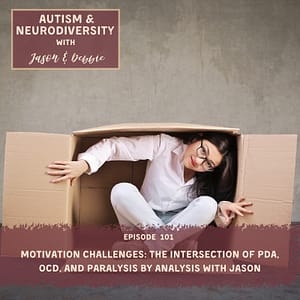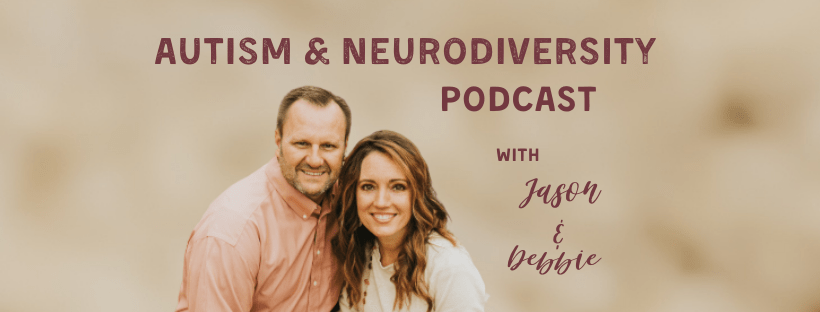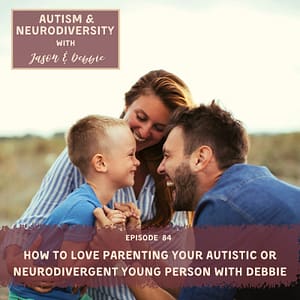[00:03] Jason: Welcome to the Autism and Neurodiversity podcast.
[00:06] Debbie: We’re here to bring you helpful information from leading experts and give you effective tools and support. I’m Jason Grygla, a licensed counselor and founder of Techie for Life, a specialized mentoring program for neurodiverse young adults.
[00:19] Jason: And I’m Debbie Grygla, a certified life coach. And maybe most importantly, we’re also parents to our own atypical Young Adults.
[00:30]
Friends. Hello. Welcome. I’m so glad to have you joining us here in our little corner of the podcasting world. So today I want to talk to you about when our autistic and our neurodivergent young people get stuck or struggle and their development starts to slow or even stall out.
And there’s one thing that’s usually at the bottom of that that I see, and it’s not what we typically think. It’s not because they’re neurodivergent or they have a disability or they haven’t learned a certain behavior yet, or they’re not motivated.
What I see as being at the bottom of that stalling out and getting stuck is usually it’s shame based thoughts, stories, and beliefs that they have internalized over time. And they might pick up these beliefs from being a neurodivergent in a neurotypical dominated society and culture, or they may pick up these thoughts and beliefs in response to fails that they experience or social struggles that they go through, or being on a different developmental timeline or even order than their neurotypical peers.
And sometimes they can even pick these beliefs up just because of all the people trying to go in and help them, which can feel like they’re trying to be fixed, which sends a message that you’re broken. And so the benefit of practicing NDM, Neuro-developmental Mentoring that we teach and advocate… practicing NDM and doing the work of un-shaming, of supporting them and mentoring them in a way that’s un-shaming and helps them un-shame themselves. It expands their capacity and their resilience for overcoming challenges. And when they start to become un-shamed, their development accelerates and they’re actually more willing to try new things or try again without fear of failing all the time.
And when we’re not aware and we don’t intentionally address shame, we actually may inadvertently contribute to their poor mental health and even poor physical health. And when we’re contributing to shame, we actually compound their blocks and struggles. And so we really want it. I want you to have a clear understanding of shame-based thinking and what it does and how it plays out.
There’s a difference between guilt and shame. It’s an important differentiation that I want to offer you. Guilt is thoughts about our actions or about how we treat someone or what we do in the world. So guilt looks like, I feel bad that I did something. Like, I feel bad for doing a thing. I feel bad about hurting someone or showing up in a way that isn’t in alignment with my values or who I want to be. So I feel bad about the action that I took or didn’t take.
Shame, on the other hand, is thought stories and beliefs that we turn on to ourselves like negative ones. So shame looks like I’m bad now, I’m sorry for doing this thing that hurt you. Or that was, you know, that I think is bad. I did this thing and therefore I’m bad, I’m broken, I’m worthless, I’m not good enough, I’m a problem.
And when we have shame based thoughts and beliefs and stories that we internalize, we feel very negative emotions like insecurity, embarrassment, worthlessness, hopelessness and even despair. And when we feel those kinds of emotions, our brain does not feel safe. It actually feels threatened. That feels scary to feel those kinds of negative emotions.
And what happens is it triggers a lower brain nervous system threat response which we describe as fight, flight, freeze and fawn. And then from that response, that threat response, we show up in those four ways.
So a young person that feels worthless and bad and they are embarrassed, for example, if their flight response gets triggered, they might get angry or defensive. They might be very opposite positional and defiant reactive. They may even get aggressive and emotionally or physically violent when it’s coming from a shame based response. That is not that they haven’t learned how to not hit people, for example. It’s because they’re reacting and they haven’t been. They don’t have the skill set to manage that response system that’s going on for them. Or it might look like flight. So if they’re feeling embarrassed, their flight response gets triggered and they’re going to do anything they can to create distance from that emotional pain and discomfort.
So that might look like hiding or avoiding. It could look like self sabotage. It can also look like buffers. So any substance or activity that they use to create distance between their emotional pain so it could look like over gaming or oversleeping, overeating. In adults, it can look like overdrinking, porn use, all those kinds of things that have a quick feel good, but maybe a long term negative back end consequence to it. So that would be like a flight response.
When they have a shame based thought I’m not good or I’m broken or I’m flawed and they feel despair, they might have a freeze response where they want to isolate or they get stuck in the spin of like ruminating on their problems or their inadequacies or what they did wrong or their fears. This is where you might see a lot of rigidity, where they’re just stuck in a black and white thought and they won’t budge. They just freeze up into it and they grab onto it because they’re having a threat response, they don’t feel safe and rigidity. Like holding the steady can feel safer or trying to create safety. This is where you’ll see them freezing, shut down.
Then there’s the fawn response where they feel so embarrassed or humiliated or terrible about themselves that they will mask. You often hear autistic masking where they pretend to be something they’re not to fit in, so they don’t have to feel embarrassed or they might people please and just do what other people want so they can be agreeable and not have to feel those negative emotions. It can look like pretending or lying even. It can look like passive aggressive behavior where they seem compliant and then they go do what they want to do, but they appear to be compliant.
That fawn response is one of the reasons that behavioral approaches are so damaging to our autistic, especially our autistic. Our autistic and neurodivergent young people because they’re pretending to be something they’re not. And it’s exhausting and it can contribute to chronic illness, poor mental health, and this burnout where you just got nothing left because you can keep pleasing and masking and not being honest about where you’re at and what you’re feeling and you’ve been ignoring your own nervous system responses that are exhausting.
So we want to be aware of what shame based thoughts, beliefs and stories, how they play out in our behaviors of our young people and as parents and mentors. So if I’m having changed thoughts and stories and beliefs about, say for example, my parenting, my child isn’t doing well and I make it mean that I’m a bad parent and I feel embarrassed or like a failure, I feel worthless as a parent, then I might have a triggered lower brain fight freeze response.
And that can look like if it’s a fight response triggered, that can look like getting angry and yelling, getting into power struggles, trying to control our young person so that we don’t have to feel bad. It’s when we react or even get very defensive. A flight response. As a parent mentor can look like avoiding and also buffers our own buffers that we use to try to create distance from these negative emotions that we’re experiencing and contribute to all kinds of things, even like overworking and overexercising, like, things that could be healthy, but we do it to an extreme and it causes problems, let alone over drinking and over feeding, over spending, all that kind of stuff.
A freeze response as a parent mentor might look like where we’re spinning or we’re ruminating or I see this a lot with parents where we’ll catastrophize and just go to all the worst case scenarios and just spin out on them and not be present. We just sort of freeze up in those worst case scenarios and we don’t do anything, we don’t take any action, we just exhaust ourselves and a fawn response.
And we see this a lot with parents where as parents we people please, or people please in our parenting where we enable or we walk on eggshells and just want to appease our young person in unhealthy ways. It’s our attempt to keep our young person happy and comfortable often at the expense of supporting their development, like having boundaries and holding your ground and doing what’s best and supportive, not doing it from a place that I just have to keep you happy and I can’t handle your discomforts. I’m going to fawn. I’m going to do everything I can to make you comfortable, which actually is hurting you in the long run.
So I want you to be aware of how this response plays out and how shame affects their development and our development. So this lower brain fight Freeze Fawn response when we’re in survival mode shuts development down, okay? When your mental and emotional resources get diverted to survival at all cost, when our young person is just totally in survival mode, their development can’t happen because development is uncomfortable.
Development takes mental and emotional energy. And when you’re diverting your brain diverts all the resources to survival, it doesn’t have the capacity to take on more discomfort that’s required for development to happen. And our young person can’t show up as their best higher brain self when they’re in a lower brain survival mode.
Now, this is why all the interventions, the supports, the helps, the efforting on our part and the efforting on the part of our young person’s support teams is often not working. It’s because we’re all trying to address behaviors that we see, like, oh, you shouldn’t get angry, or you shouldn’t be so rigid, or, you know, oh, you’re not getting enough support academically. Maybe we’re looking at all these things to address the behaviors, and we’re not addressing the shame based thinking behind these fight, flight, freeze, fawn triggered behaviors that we’re seeing. We’re just addressing the behaviors.
And so, like, for example, this plays out quite a bit actually. We’ll have a young adult that comes to Techie for Life, our program, where we mentor neurodivergent young adults and help them get on an educational career path that fits them and what they want to do. And they say, I want to get a job. They get to that point where they’re ready for a job, they want a job, and we start prepping them for that.
If they have shame based thoughts, beliefs and stories that they’ve internalized because maybe they’ve had jobs in the past that they got fired from or they’ve never had a job and they don’t know if they can do it. Or they think that they won’t be good enough or the job that they’re getting isn’t good enough for them because their first job that they think they should have a different job.
Like whatever is going on, if there’s something about the whole job thing. And they have shame based beliefs where they are a failure and they have lots of evidence that they are broken or something is wrong with them. When they go to get a job, you immediately can see where they’re going to sabotage that. They’re maybe not going to show up for the interview or they might go up for the interview, but they freeze up at the interview or they even get the job, but then they don’t show up to work. Because when we’re in a Fight Flight Freeze Bond response, we don’t show up as ourselves. And it’s hard to do things like get a job and keep a job that’s not in our comfort zone and it’s a stretch for us and a new experience and that can feel really scary. And it takes a lot of mental and emotional energy to be able to do a job, get a job, and keep a job. And so a lot of times, we won’t see them be able to be successful, but until they have done some work and gotten coaching and helping and mentoring to, like, work through those shame- based thoughts, beliefs and stories, that keep triggering that fight flight free spawn response.
Unshaming requires us to have an awareness and mentor for neurodivergent young people in a way that feels nonjudgmental, where we’re showing up with curiosity and compassion. If we pass judgment, we may inadvertently be contributing to their shame based thoughts worth of beliefs and just reaffirming them.
When we do the work of unshaming and mentoring a young person, the goal is to poke holes and loosen the tight fisted grip that these shame based thought stories and beliefs about themselves have taken hold of, right? Like so we want to be able to poke holes in that. We want to point out evidence where they do have success and where it’s okay to fail and make mistakes.
Because even though they have many of them years and years of evidence for why they’re bad, broken, not good enough, worthless. The truth is, it’s all a lie. They all have incredible value and worth right now, disability or not, just as they are, whether they develop or improve another day in their life or not. We don’t work on development and we don’t support development to prove worth or good enoughness.
We work on development because it’s fun and our brains crave it. And it’s a part of being alive and human and it’s a part of the human experience. And our brains crave development. Our brains crave challenges and overcoming things and developing your kids development or lack thereof.
Your kid’s behavior does not have any bearing on your own value and worth and goodness as a parent and a mentor, embracing your humanness, your strengths, your weaknesses, and loving and being kind to yourself, all of yourself, is at the heart of unshaming. And it’s work worth doing as you mentor others.
I encourage you to get on our email list and join us in this work and share this podcast with others who you know would appreciate it and benefit from this too, so that we can support each other. This is important work. There’s good things happening when we are willing to be uncomfortable and do this work of unshaming and shine a light on what’s actually keeping us stuck. So I hope you have an amazing week and take care.
[13:07] Debbie: Thanks for joining us on this episode of Autism and Neurodiversity with Jason and Debbie. If you want to learn more about our work, come visit us at jasondebbie.com.




